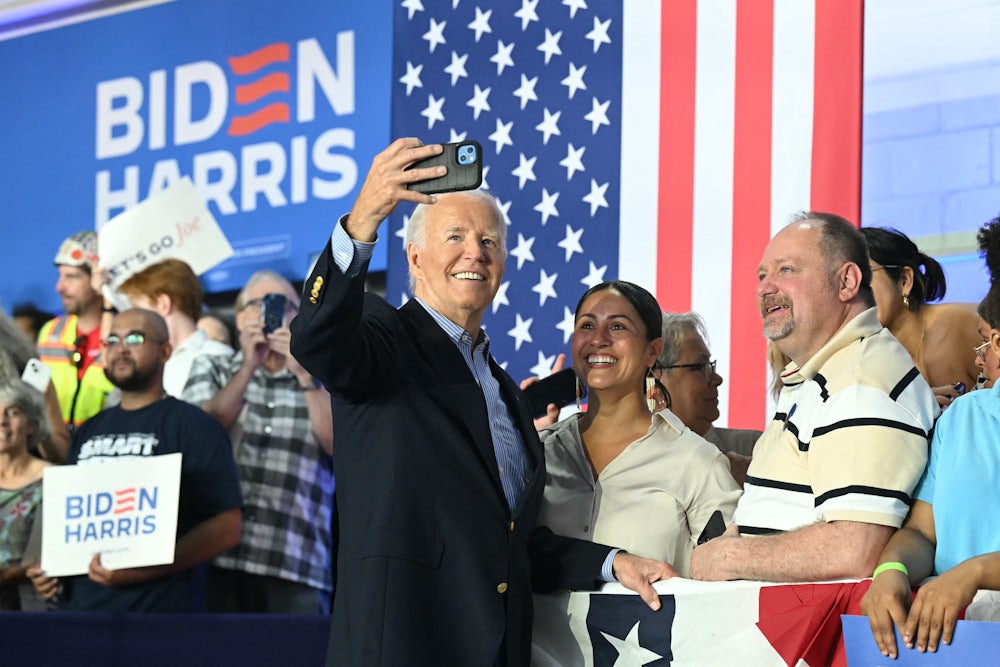Every media feeding frenzy is built
around a narrative that completely snuffs out the counternarrative. In this
case, three weeks now after President Biden’s shocking debate performance, the
narrative is that a consensus has formed within the Democratic Party that he
has to stand down for the party to stand a chance to beat Donald Trump in
November.
I’ve been part of this consensus since my first postdebate column three weeks ago today. Nothing that’s happened since has changed my mind. Biden’s Lester Holt interview this week wasn’t a disaster. But the metaphor I kept thinking about was that of an aging athlete who just didn’t have his old stuff anymore—Willie Mays in 1973, Brett Favre with the Jets. Biden cut off his own sentences, he was tetchy and surprisingly defensive, and it was hard to imagine him being anything like a forceful presence on the campaign trail.
Now the Democrats are moving more publicly to force him out. It’s obviously the right move. But it isn’t without risks, and this is where Democrats need to be mindful of the existence of the counternarrative, which is most clearly expressed like this: If 65 percent of Democrats want Biden to go, that means 35 percent don’t, and 35 is a big number.
I’ve written five columns since the debate arguing in one way or another that Biden should step aside. Every time, I’ve encountered a wave of tweets from non-insider Democrats who are furious about this. Their language has often been as angry as that of any right-winger reading one of my normal columns. Shut up, you hack. You people should be ashamed. Joe has been great, and I’m with him all the way, and if you aren’t, get out of the way.
Again, I think these people are wrong. But the point is they’re out there. Every day this week, I’ve spent some time scrolling through X reading their posts. They’re furious. Assuming Biden is pushed out over the next few days, they’re going to be madder still. The desire for Biden to retire may have reached the point of near-unanimity on Capitol Hill—although not total unanimity yet; who would have thought that AOC would be among his last defenders?—but evidently among the rank and file, that isn’t the case, and party leaders need to pay attention to this.
The position of these people seems to boil down to two points. One, they believe Biden has been a great or at least very good president. Two, they voted for him in the primaries this spring, and they resent the fact that their votes are now on verge of being nullified.
On the first point, the Democrats pushing Biden to leave the race would agree. But it’s not an argument that carries much weight to me. Yes, normally, a very good president deserves reelection. But not always. If there’s ample evidence that he may not be up to the task of running a strong campaign against an aggressive opponent whose victory would result in national and maybe global calamity, well, people are allowed to make that judgment, thank the incumbent for his terrific service, and urge him to move on.
It’s on the second point that Democrats need to come up with an answer that might satisfy the Last Bidenistas. The guy did get 14.5 million votes. Granted, a primary season involving an incumbent president isn’t the most small-d democratic process in the world. We can all point to important exceptions—Ted Kennedy in 1980, Pat Buchanan in 1992—but typically, these are plebiscites. At the same time, however, anybody who wanted to run against Biden could have. They didn’t, and he won every primary except American Samoa (won, incidentally, by someone named Jason Palmer).
The people who are pushing Biden out are doing the right thing, but they can’t forget these voters. Sure, most of them will come around in the end. But most isn’t enough in an election where the key states might be decided by 20,000 votes.
A lot of this will depend on Biden himself. Self-isolating with Covid, he’s said to be fuming right now. In a few days, maybe he’ll work his way through the stages and come to terms with reality. One hopes he will realize that he can turn this from a moment of resentment and humiliation into one that will put him alongside the only two other people in political history who are widely known for willingly giving up power for a greater good: Cincinnatus and George Washington. The latter is a pretty good comparison for an American politician. Biden will be a hero to Democrats and liberals, and maybe even some swing voters too. But it will depend in part on Biden persuading his most loyal voters—the ones who have been hurling invective at people like me—to join him in taking one for the team.
Kamala Harris is no sure bet. And in my dreams, I’d still prefer an open process whereby the nominee (Harris, a governor, a senator, whoever) is the person who wins the delegates at the convention, but it feels probably a little late for that. Either way, this is risky. But Biden is clearly riskier. Harris or anyone else would at least inject comparative youth and energy into the race. Young people would mostly vote for her, whereas the 18–29 Democratic vote was just going to crater under Biden.
And Donald Trump is not popular. The man who gave that waterlogged speech Thursday night at the convention is beatable. But he’s beatable only by a party that is united behind its ticket. That means paying some extra attention to that 35 percent who were perfectly happy with Joe.






